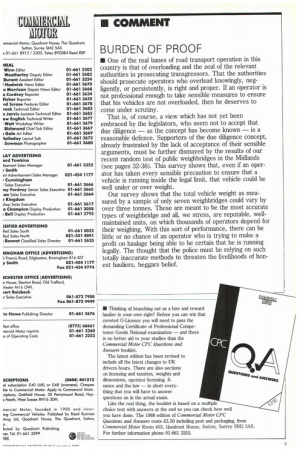BURDEN OF PROOF
Page 3

If you've noticed an error in this article please click here to report it so we can fix it.
• One of the real banes of road transport operation in this country is that of overloading and the zeal of the relevant authorities in prosecuting transgressors. That the authorities should prosecute operators who overload knowingly, negligently, or persistently, is right and proper. If an operator is not professional enough to take sensible measures to ensure that his vehicles are not overloaded, then he deserves to come under scrutiny.
That is, of course, a view which has not yet been embraced by the legislators, who seem not to accept that due diligence — as the concept has become known — is a reasonable defence. Supporters of the due diligence concept, already frustrated by the lack of acceptance of their sensible arguments, must be further dismayed by the results of our recent random test of public weighbridges in the Midlands (see pages 32-36). This survey shows that, even if an operator has taken every sensible precaution to ensure that a vehicle is running inside the legal limit, that vehicle could be well under or over weight.
Our survey shows that the total vehicle weight as measured by a sample of only seven weighbridges could vary by over three tonnes. These are meant to be the most accurate types of weighbridge and all, we stress, are reputable, wellmaintained units, on which thousands of operators depend for their weighing. With this sort of performance, there can be little or no chance of an operator who is trying to make a profit on haulage being able to be certain that he is running legally. The thought that the police must be relying on such totally inaccurate methods to threaten the livelihoods of honest hauliers, beggars belief.










































































